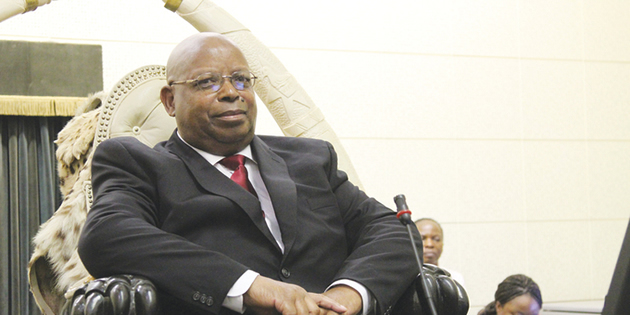Parliamentary Legal Committee rejects Bill

Lloyd Gumbo Senior Reporter
The Parliamentary Legal Committee has rejected the Criminal Procedure and Evidence Amendment Bill, arguing that it retains provisions that violate the Constitution.
The PLC is responsible for determining whether a Bill, if passed into law, would not contravene the declaration of rights or any section of the Constitution.
As such, the committee wants alignment of existing laws to the Constitution to be in sync with the letter and spirit of the supreme law of the land that has been hailed as defending human rights.
National Assembly Speaker Advocate Jacob Mudenda on Tuesday announced that he had received an adverse report from the PLC on the Bill.
“After deliberations, the committee resolved that an adverse report be issued in respect of Clause 30 of the Bill amending Section 1221 of CAP 9:07,” reads the report seen by The Herald.
“In compliance with Standing Order 32(3), members of the committee legally qualified as envisaged by Section 152(2) of the Constitution unanimously agreed (present were Honourables Jonathan Samukange, Fortune Chasi, Ziyambi Ziyambi and Jessie Majome) the Bill contained provisions that, if enacted would violate the Constitution.”
The committee argued that Section 121 (3) of the Bill had not changed since it provided that a magistrate or judge’s decision to admit an accused person to bail would be suspended immediately after the decision if the Prosecutor-General or public prosecutor notifies the magistrate or judge about their intention to appeal against the decision.
“The mere difference is that an accused person shall now remain in custody despite being found to be a proper candidate for bail, for a further 72 hours as opposed to the seven days,” said the PLC.
“The controversy surrounding this provision is the suspension of the court’s order to admit an accused person to bail upon prosecution notifying the court of its intention to appeal against such an order. It is clear that the provision creates ‘inequality of arms’ and tilts the scale of justice unfairly to the prosecution side at the expense of the accused.
“The principle of ‘equality of arms’ is recognised in international human rights law as integral to the right to a fair trial entitling both parties to the same procedural and substantive rights and powers before the courts, in order to present their cases without any party suffering substantial disadvantage.
“The court’s decision to admit a person to bail is overridden by the notification made by the prosecutor to the court, resulting in the further detention of the accused person for a further period of 72 hours.
“The further detention of the accused violates Section 49 of the Constitution, which guarantees the right to personal liberty save in certain circumstances listed in Section 86 and 87 of the Constitution.”
The legislators added that the Constitution on Section 3 (2) (e) recognised the doctrine of separation of powers where courts were given the jurisdiction to determine the accused’s rights to avoid “pre-trial incarceration”.
“It is the committee’s opinion that Section 121(3) should be replaced with a requirement that a warrant of arrest be issued to apprehend the accused person in the event of the appeal succeeding as prevailing in other jurisdictions.
“Due to the aforesaid, the committee resolved on a majority of 4:0 to issue an adverse report on the Bill,” read the report.
The Bill will now be referred to Vice President Emmerson Mnangagwa who oversees the Minister of Justice, Legal and Parliamentary Affairs, to consider issues raised and then send it back to the PLC.
Parliament may disagree with the PLC on its conclusions, which would result in the Bill being passed in its current form.









Comments